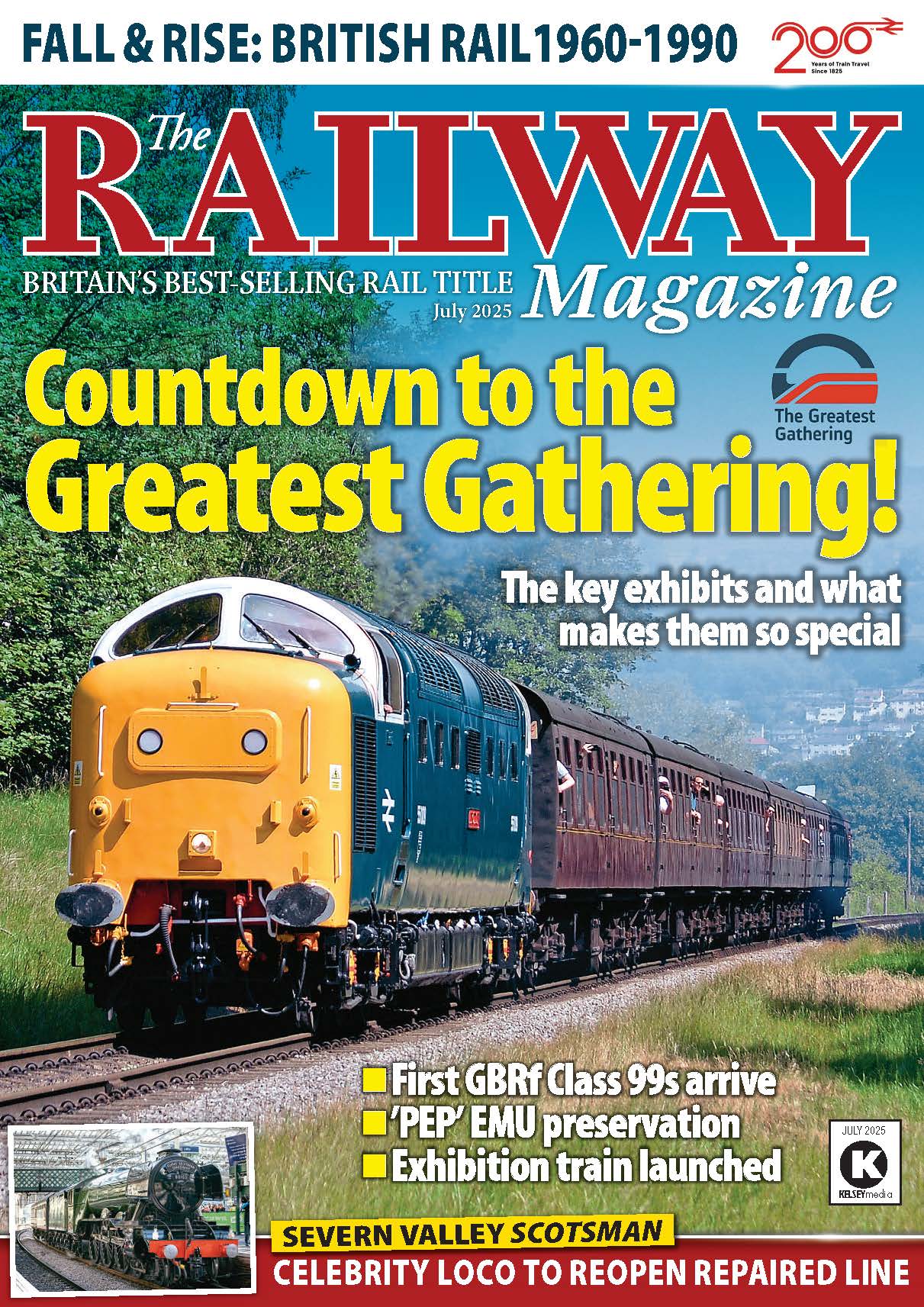The East Coast has proved something of a ‘poisoned chalice’ to franchisees in the past, but Stagecoach/Virgin are determined to make a success of it despite open access threats and jitters caused by the recent ‘Brexit’ vote. Nick Pigott meets managing director David Horne to find out how the operator intends to meet the challenges.
EYEBROWS were raised in some sections of the railway world in 2014 when the East Coast franchise was awarded to the operators of the rival West Coast route.
‘Surely Britain’s two Anglo-Scottish lines should be in healthy competition with one another’? was the question on many lips as it became clear that the fastest trains on both sides of the country would soon be wearing Virgin Trains branding.
The situation, of course, wasn’t as straightforward as it appeared. Sir Richard Branson’s Virgin Rail Group owns 51% of the West Coast franchise, with partner Stagecoach, run by Sir Brian Souter, possessing the other 49%. However, on the East Coast, the two consortium members switched roles, with Stagecoach being by far the most dominant partner, with 90%.
Monthly Subscription: Enjoy more Railway Magazine reading each month with free delivery to you door, and access to over 100 years in the archive, all for just £5.35 per month.
Click here to subscribe & save
Despite the Branson share in the enterprise being so small, East Coast’s trains, stations and publicity material all carry full Virgin branding – reflecting the companies’ desire to showcase the proven strength of the brand in the long-distance high-speed market, as established on the West Coast.
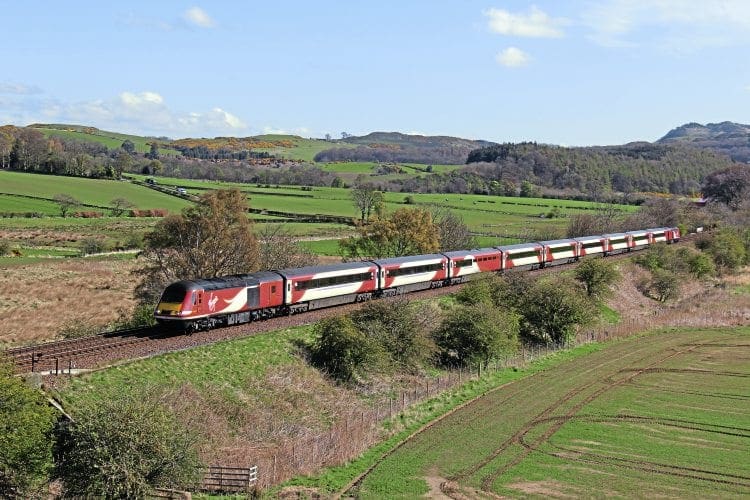
The man tasked with making a success of the King’s Cross to Scotland operation is 43-year-old David Horne, formerly managing director of Stagecoach’s East Midlands Trains franchise and now commanding a similar position on Virgin Trains East Coast (VTEC).
“The competitive aspect was a big issue at the time of the bid,” David told me as we chatted aboard a Class 91-hauled train speeding from his regular commuter station of Newark to his office in York. “There was a rigorous process of presuming that there would be a reduction in competition and it was down to each franchisee to demonstrate through evidence to the Competition & Markets Authority that there wouldn’t be.
Reputation
“The fact that one route is primarily run by Virgin and the other by Stagecoach satisfies the authority’s concerns. Only the titles and liveries are similar – but to be honest, the real competition is not so much between rail routes as between rail, road and air.”
The East Coast franchise has for the past few years gained something of a reputation as a ‘poisoned chalice’, having proved to be the undoing of former operators Great North Eastern Railway (owned by Sea Containers) in 2007 and National Express East Coast two years later. Both companies effectively had to hand back the keys to the Government after encountering financial difficulties.
Half a decade of nationalisation then ensued as the operation was put into the hands of a Government caretaker company – Directly Operated Railways – before being returned to the private sector in March 2015 when VTEC physically took over, but there were some in the industry who felt the stop-gap arrangement had been successful enough for East Coast to be retained in the public domain.
Whether it should have been or whether Stagecoach/Virgin will ultimately succeed where others failed remains to be seen, but the latter’s commitment to pay £3.3billion in premiums over eight years was well in excess of rival bids and alarm bells would therefore ring at the Department for Transport if anything untoward were to occur.
Initiatives
Last year saw passenger figures rise by more than a million, helped partly by the sort of fare-reduction initiatives David piloted at Wales & West (see panel), but the numerous ‘untoward’ developments that have resulted from this year’s ‘Brexit’ vote (Sir Richard Branson lent his name to the ‘Remain’ campaign) have understandably caused jitters. The rate of growth this year has slowed, a situation Stagecoach blames on cheaper petrol prices, terrorism fears and a weaker economy, but the situation is exacerbated by Network Rail spending cuts, which threaten to delay upgrades on the route.
If the promised infrastructure improvements are not in place by the end of the decade, it could impinge on the acceleration and speed capabilities of the forthcoming ‘Azuma’ EMUs, due to be on delivery to the ECML by then. That could adversely affect the increased passenger figures on which a large part of the franchise bid was based in 2014.
The Hitachi-built ‘Azumas’ (a mix of Class 801 electrics and Class 800 ‘bi-mode’ electro-diesels) are physically capable of running at 140mph like their Southeastern cousins, the Class 395 ‘Javelins’, but such speeds on the ECML will have to wait until the route infrastructure is set up for in-cab signalling.
European Train Control System (ETCS) signalling is scheduled to be in place on sections south of Doncaster by the end of the current franchise, in spring 2023, a flyover or diveunder is due to be built at Werrington Junction, north of Peterborough, and an extra track is due to be reinstated between Huntingdon and Peterborough, but the huge political and financial uncertainty caused by the recent decision to leave the EU means that nothing can be taken for granted at the moment.
In the meantime, steps are being taken by NR to beef up the overhead line equipment, which was erected to a tight budget by British Rail and is now more than a quarter of a century old in places. Pantograph de-wirement incidents have caused numerous delays over the last few years and, at times of high winds, line speed sometimes has to be reduced to 80mph. One of the headspans at the southern end of the route has recently been replaced with a steel beam as a trial in an exercise known as ‘portalisation’, and NR is looking at replacing other headspans on other stretches on a gradual ‘one-a-night’ rolling programme.
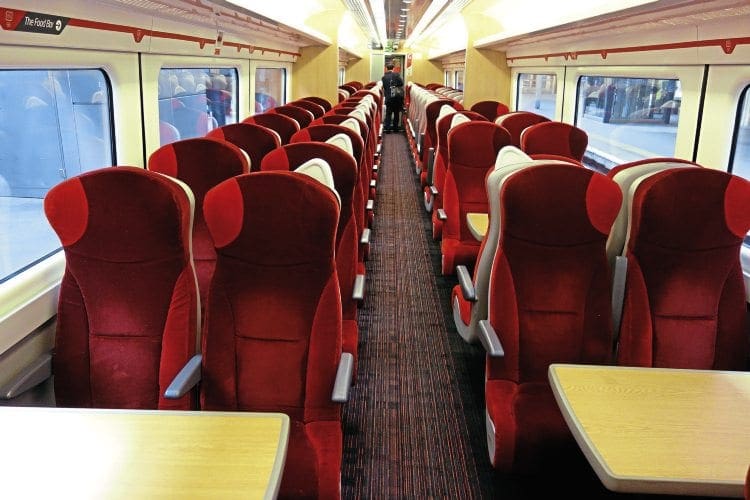
Another recent development that has caused unrest at East Coast is the decision by the Office of Rail Regulation (ORR) to grant an open access service to bitter rivals First Group, which had lost out in the original bidding for the route two years ago and had crossed swords unsuccessfully with Branson over the West Coast franchise in 2012.
First Group also owns the East Coast open access operator Hull Trains.
Big gripe
David added: “Until now, open access contracts have mainly been granted for destinations that weren’t regularly served by other operators in order to prevent abstraction of revenue, but this one is going to serve main stations of ours such as Edinburgh, Newcastle and Stevenage five times a day and will be run on a cheap, one-class, no-frills basis. This no-frills approach is not the Virgin strategy – people making the four-hour journey between London and Scotland tell us they want a reasonable degree of comfort, which is why we’re making the improvements we are.
“The ORR has approved our own application for service extensions to Edinburgh and Middlesbrough from May 2021, but has accepted that First Group’s trains are expected to impact revenue from VTEC services. Competition-wise, we’re on our toes anyway because of the budget airline flights from Newcastle, Edinburgh and Aberdeen, and we’ve recently introduced a £25 fare between Edinburgh and London in a bid to counter that.”
The big gripe regarding the principle of open access generally, of course, centres around the fixed costs that have to be met by a franchised operator. “We’re having to pay the Treasury and Network Rail more than £4million a week in fixed costs, whereas First Group may not have to pay any,” says David.
“Stagecoach chief executive Martin Griffiths is on record as saying that we don’t believe the granting of such services within a franchised system and without a level playing field to be in the best interests of passengers, taxpayers or communities, and the DfT has now asked ORR to look into the situation, so hopefully the playing field will become more level.”
ORR’s surprise decision to ‘move the goalposts’ after Stagecoach/Virgin had signed up to the stringent requirements of the East Coast contract could make it more difficult for the operator to meet the premium commitments to the DfT, but it is nevertheless pressing on with its promised £140m investment programme. This includes a £21m interior refurbishment for the entire fleet, an enhanced train service at every station on the system, and an increase in the number of trains leaving King’s Cross from 10 every two hours to 13 every two hours by May 2021.
Mix-and-match
To achieve the latter, the 65 forthcoming Class 800s and 801s will be mixed-and-matched with the best six of the Class 91-powered carriage sets to give a total of 71 trains, 23 of which will be electro-diesels, capable of running off the wires to locations such as Inverness, Lincoln and Harrogate.
At present, East Coast’s non-electrified routes are served by ex-British Rail InterCity 125 diesel-electrics, and although an additional set was acquired from East Midlands Trains in mid-May to extend a Newcastle service to Edinburgh, and thereby meet another franchise commitment, the writing is on the wall for the 1970s-vintage HSTs on the ECML, with the last scheduled to be withdrawn or transferred away in late-2019.
Hitachi’s Newton Aycliffe assembly plant is due to deliver the first production series ‘Azuma’ for East Coast in August 2018, once the first 57 members of the Great Western fleet have been delivered, although test-running of Virgin-liveried pre-series vehicles has been taking place on the Old Dalby test track and elsewhere this year.
There are exciting plans once the new trains are in full service, with one (possibly two) ‘Azumas’ an hour serving the likes of Bradford, Lincoln and later Middlesbrough.
In the meantime, Stagecoach/Virgin is undertaking a major internal upgrade to see the current rolling stock through to that point. The interiors of all 45 East Coast trainsets (401 carriages) are being refurbished and 24,123 seats are being replaced, along with refurbished toilets, new carpets and curtains, while the carriages of the Mk4 fleet are being fitted with back-up power supplies.
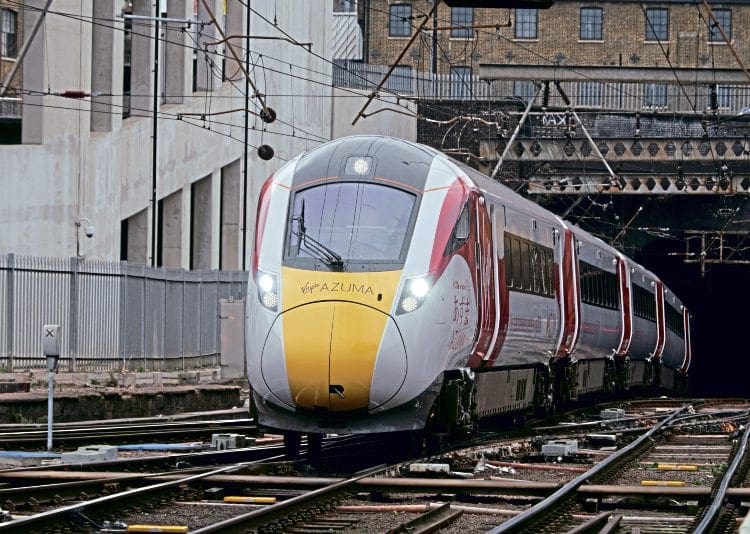
At the time of going to press, 22 of the 45 trainsets had been completed – 12 HSTs at Edinburgh Craigentinny depot and 10 InterCity 225s at Bounds Green depot, in north London. Once Craigentinny has completed the HST work, it too will move onto Mk4s.
Each refurbishment involves the complete stripping-down of the interiors with new foam and upholstery being fitted… bright Virgin red material for standard class and a plush dark grey leather for first.
Popular
“This is the largest investment of its kind ever seen on the East Coast route,” says the VTEC managing director. “Passenger reaction has been excellent – we conduct our own surveys in addition to those carried out by Passenger Focus and are receiving some very positive reactions. Some of the old seats were virtually worn out!”
The reason for leather upholstery in first class is to re-create the feel of an executive car and is an idea borrowed from David’s former franchise at East Midlands Trains, where it proved popular among business commuters, who’d switched from road to rail.
At-seat entertainment is another advance. ‘Beam’ was launched in early June and is now on all trains, accessible not via seat-back screens but through passengers’ own tablets and smart devices, and it provides them with an enhanced TV and games service through the Virgin wi-fi system.
East Coast’s HST power cars have all received MTU engines in recent years, but the Class 91 locomotives as a fleet have had no fewer than 200 ‘points of single failure’ identified. Although some are very minor, modifications are being made in a bid to improve the reliability of the electric locos and while that’s ongoing, Class 67 ‘Thunderbird’ diesels will continue to be stationed at King’s Cross, Doncaster, Newcastle and Edinburgh for the foreseeable future.
“The ‘Azumas’ will have far more resilience because they won’t have nearly so many single points of failure,” explained David. “Their ability to switch from electric to diesel and vice versa without stopping will also enable us to run over partly wired routes without having to waste so much diesel fuel.”
In terms of infrastructure, the new franchise holder is spending a large proportion of its overall £140m investment in station improvements, training facilities and additional car-parking spaces. One of the biggest complaints arising from increased patronage of British trains in recent years has been the lack of parking spaces available for off-peak passengers in the middle of the day. East Coast is addressing this by increasing the size of car parks, Newark, Retford and Durham being recent examples, the latter receiving a second deck.
David is a disciple of the ‘hands-on’ creed of management and tries to meet as many of his staff as possible each day, especially during his journeys to York and London from his Nottingham home. With 3,000 employees and crew, it’s not possible to bump into all of them, but he’s certainly one of the better-known rail chiefs.
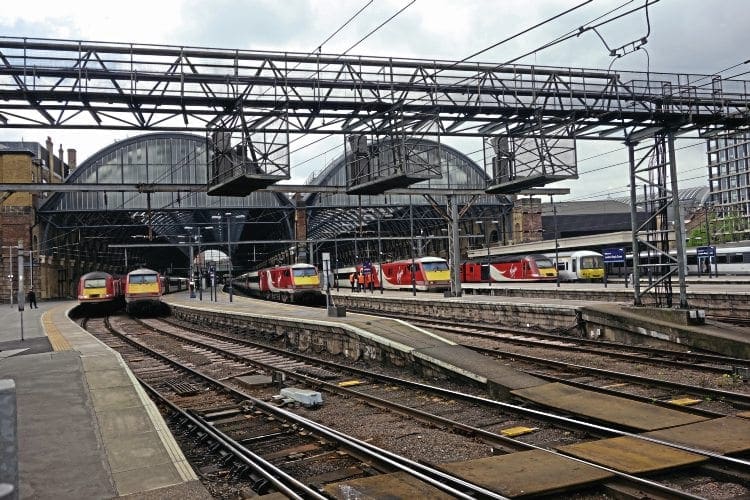
Helping to cement that bond between manager and staff are initiatives such as a recent suggestion scheme that produced ‘Azuma’ as the name of the Hitachi trains. About 300 suggestions were received, many of which had Japanese connections, but with Azuma being the historical name for eastern Japan, it seemed the most appropriate for the East Coast.
Racehorse
David adds, however, that there are no firm plans as yet to continue an East Coast tradition by naming each individual train.
Given that some enthusiasts are already speaking of ‘Zoomers’, it would seem natural to give the trains names associated with speed, which would be in keeping with the bird and racehorse appellations of the LNER Pacifics and some of the ‘Deltics’. There’s plenty of time between now and 2018 for that suggestion to be acted upon.
Heritage is seen as an important factor at East Coast and the company sponsored the Flying Scotsman season at the National Railway Museum recently. David says: “We’ve seen how a locomotive like that can get the public interested in trains and rail travel generally so we’re very happy with steam on the East Coast Main Line as long as Network Rail can ensure a reliable service for our own trains.
“However, even with the plan to reopen the third tunnel at King’s Cross, I think it’ll become more and more difficult to find paths for steam in the London area in the future because of the sheer number of services – but further north would be no problem.”
Back in 2004, Virgin owner Sir Richard Branson was one of the high-profile names involved in saving Flying Scotsman for the nation. Although often overseas these days, he still keeps a close watch on his various businesses and, says the VTEC chief, “gets a buzz from the prospect of transforming the King’s Cross line with ‘Azumas’ the way he did the Euston route with ‘Pendolinos’.
“Exciting times lie ahead for Virgin Trains East Coast and I’m proud to be a part of it,” added David.
DAVID HORNE – Profile
VIRGIN Trains East Coast managing director David Horne, 43, began his rail career in the Truro office of British Rail’s Cornish Railways sector, where he landed a summer holiday job as a ticket clerk in 1988 following a fortnight’s unpaid work experience.
Having attended school just yards from Truro station and seeing a mix of trains worked by Class 50s, 37s and HSTs during that time, he gained an early taste of what work in the rail industry could offer, and in later years travelled extensively on trains in countries as diverse as Thailand and Tanzania.
Excellent
After gaining a degree in transport management at Birmingham’s Aston University, he left in 1993 to become pricing manager at BR in Swindon for three years. “That gave me an excellent grounding in the nature of the rail business and an opportunity to test different fares in the market to gauge response,” he said.
“I’m the sort of manager who likes to try new ideas and pursue initiatives rather than rely on tried and tested practices.”
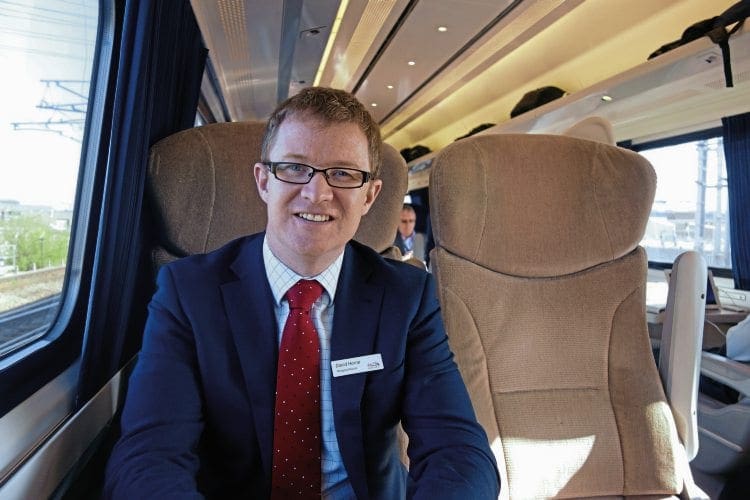
Quite a few new stations were opened or reopened during his time in the West Country – Ivybridge, in Devon, and the Swanline stations, in South Wales, in 1994, for instance – and his role was to work out how best to generate decent revenue without deterring people from sampling the new services.
A particular challenge was the Maesteg branch, which was declining in the days before the Valley Lines were privatised, so he decided to cut the fares to make them more competitive with local buses – and both passenger numbers and revenue recovered strongly.
Skills
Privatisation saw the part of BR Regional Railways David worked for franchised in late 1996 and taken over by Prism Rail, which branded the operation Wales & West. The following year, David moved to South West Trains as business planning manager.
At that time, SWT’s franchise-holder, Stagecoach, had just ordered the Class 458 EMUs from Alstom, and one of David’s first tasks was to decide which routes they should be deployed on, plumping for the Windsor services.
Mk1 slam-door stock was also still in service at that time and part of his job was to begin planning for its replacement.
Such high-profile roles were starting to get David’s management skills noticed by his superiors, and in 2001 he was involved in the company’s franchise-building team, later being seconded for a couple of years to Euston to work with Stagecoach’s partner company, Virgin Trains, on the West Coast franchise.
Virgin’s West Coast and CrossCountry businesses were at the time in a stage of uncertainty, the former bogged down in the seriously delayed Euston route upgrade and the latter tied up with making the ambitious Operation Princess project a success.
“As director of business planning, I had to come up with new business plans for both and that was a real challenge,” said David.
At the end of 2004, he returned to Waterloo to rejoin the Stagecoach team bidding to retain the SWT franchise. Not only did they secure that in 2006, but the next year went one better by winning the new East Midlands Trains franchise. For that, David was handed the huge responsibility of setting the new operation up as mobilisation director. “Because it was new, there was no job description,” he recalled. “That was a very interesting project, to put it mildly!”
Once EMT was up and running under the leadership of managing director Tim Shoveller, David took on the role of commercial director at EMT until being promoted to take over from Tim when the latter was selected to head the ground-breaking SWT/Network Rail Wessex ‘Deep Alliance’ in 2011/12.
Choice
“The only regret I have from my time at Waterloo is that we weren’t able to get all the platforms of Waterloo International into use. We first came up with the idea in 2001 – six years before Eurostar moved out – and still they’ve not all been commissioned. But thanks to the persistence of Tim and current SWT MD Christian Roth, that it is now going to happen.”
Speed improvements on the Midland Main Line route between St Pancras and Sheffield, some as fast as 125mph, marked the high points of David’s time in charge of EMT, and when Stagecoach chief Sir Brian Souter landed the East Coast franchise in November 2014, David was an obvious choice to take the reins at the route’s York headquarters.
Read more Features, News, Views and Opinion in July’s issue of The RM – on sale now!



